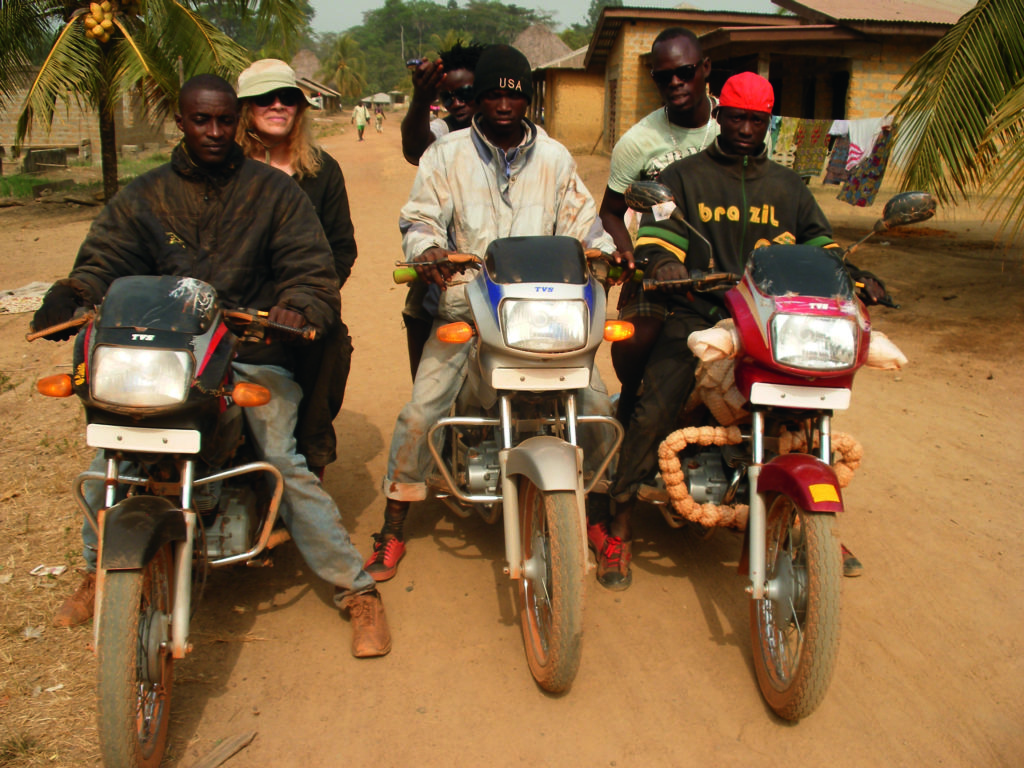Sierra Leone is slowly getting over its long and brutal civil war. That’s what the World Bank statistics tell you anyway. In 2003, Sierra Leoneans, on average, could expect to live for a miserably short 42 years. It’s now 48 years and rising. Gross National Income, or GNI, is also rising, up from $220 per year to $340. But, two-thirds of the population of six million still live below the poverty line.
In 2013, Sierra Leone finds itself in economic transition, no longer entirely dependent on external aid but still without a vibrant local economy. Although the war officially ended in 2002, it left a legacy of grinding poverty. Thousands of young people are homeless, mainly because of the poverty that high unemployment brings. Eleven years after the war ended, you still find orphans or war-damaged people who are unable to pick up their previous lives.
Hazel Chandler first visited Sierra Leone and neighboring Liberia in 2005 to make a film about the Liberian child rights activist Kimmie Weeks. Chandler is an experienced filmmaker, with an interest in making documentary films about challenging topics.
“I still find there are pockets of young men, alienated and angry, ready to go back to war. As soldiers they had money, a purpose, camaraderie and power. On the streets or in the provinces they have nothing.”
Chandler began filming with a dangerous street gang in Kenema, a large regional city North-East of the capital Freetown. When she gave the gang leader, Yumyum or Bad Man, as he is known, a hand-held camera to document his own life on the streets, an extraordinary thing happened.
“I fully expected him to film for a couple of days and then sell the camera. Yet, even when Yumyum went to prison and endured the most difficult of circumstances, he chose not to sell it for bail money. The camera became an expression of his identity and self-worth. He held on to it at all costs.”
The filmmaker quickly realized she was on to something.
“‘Yumyum’, my film, focused on the lives of three young men. Yumyum had briefly been a combatant. A-Class had lost his parents in the war, and KKDog had run away from an abusive uncle. Teaching these young guys to film and edit their own films, to document their own lives, gave them a purpose and a self-worth, which had been missing.”
After two years of filming the soon-to-be released documentary, she did what filmmakers are never supposed to do. She kept filming but stepped into the story and started to help her characters find schooling, jobs and a place to live.
From there, Chandler began to train homeless and poor people of all ages to film and edit, initially working in the offices of other charities.
“I found Sierra Leoneans living on the streets to be a talented and determined bunch, with a hunger for knowledge. They are pulling themselves up with grit and modesty and are a delight to teach. They have been the making of me, not the other way round,” the filmmaker explains.
Four years ago, alongside her son, Michael, she took the plunge to set up WAYout Arts, a charity dedicated to working with the street youth of Sierra Leone. In 2012, the WAYout Arts Hub finally opened in the center of Freetown. A music studio formed part of the Hub.
However, in tough economic times, charities worldwide were not being funded and were closing down projects.
“I think it was a happy coincidence of timing. I wrote to Strummerville, the Joe Strummer Music Foundation, when they were looking to donate outside the UK. They gave us the funds, equipment and the services to set up a music studio and taught our guys to be sound engineers,” she says.
Today, WAYout are recording street artists such as the Black Street Family. Previously, the 200-strong group was known as the Black Street Gang— among the most feared criminals in Freetown. Now, they have released an album, utilizing one of the few professional recording studios in the country.
As Chandler explains: “We won two out of the five film and music awards at Sierra Leone’s recent Human Rights Festival, and our reputation is growing. Our recorded music is regularly played on the radio and we have trained 600 young people, some of whom now work in the mainstream media. I am privileged to be a small part of that.”
In a final twist worthy of Nigeria’s Nollywood, the former gang leader Yumyum, who inspired both a documentary and then the WAYout Arts project has become Chandler’s adopted son. Yumyum is now known by his real name Amara and is regarded as family by both Hazel and Michael.
“Amara was the inspiration for everything, and he has changed my life. In Sierra Leone I am known as Mama Hazel; I fought the age and motherhood thing at first, but now I have accepted the role and I have a real sense of belonging.
“WAYout is helping people’s lives change, not least of all my own. When I’m in Sierra Leone I like who I am, which is a really nice feeling and which isn’t always true when I’m back in Britain.” FL
